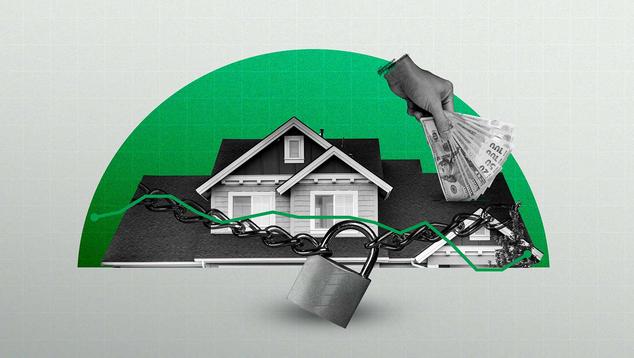LONDON — Satisfaction with the availability of “good, affordable housing” has plunged in wealthy economies over the past few years, reversing the decadeslong trend in which these economies had led the world.
Residents living in OECD (Organisation for Economic Co-operation and Development) member states — a group of 38 mostly high-income, market-based economies — have grown increasingly dissatisfied with housing locally as the rest of the world has followed a diverging path.
In the challenging years after the global financial crisis in 2008, wealthy economies remained significantly more satisfied with housing than the rest of the world was. But this changed notably after 2021.
In 2024, a median of 43% across the OECD were satisfied with the availability of good, affordable housing in their areas, compared with 50% in the rest of the world. This is marginally higher than in 2022 and 2023, when a median of 40% were satisfied, but still low compared with the long-term trend.
Many countries across the OECD have seen significant declines in housing satisfaction in recent years. Türkiye, Canada, the United States, the Netherlands and Australia recorded the lowest satisfaction figures in 2024, compared with their long-term averages. Only one of the 38 OECD countries — Estonia — saw double-digit higher satisfaction in 2024 (70%) compared with its longer-term average (54%).
Perception vs. Reality in Housing Affordability
Despite falling satisfaction, most people in wealthy countries aren’t struggling to afford adequate shelter. In 2024, just 11% of adults in OECD countries said they did not have enough money to provide adequate housing in the past 12 months, compared with 38% in the rest of the world. This reveals a striking disconnect.
In OECD countries, satisfaction with affordable housing has fallen notably in recent years, even as most people are able to afford some form of shelter. In poorer countries, where far more people face real housing insecurity, satisfaction is rising. This likely reflects differing expectations and that views toward housing depend on where one lives.
In higher-income countries, people may feel dissatisfied not necessarily because they’re homeless or on the brink, but because they perceive a decline in housing relative to what they believe should be available — such as affordable rent, homeownership or choice — even if shelter is technically secure for most. Meanwhile, in lower-income countries, satisfaction may be buoyed by gradual improvements in access to basic housing, despite greater material hardship overall.
Housing the Primary Service in Crisis in Wealthy Economies
The crisis in satisfaction with housing affordability across economies is unique in this regard, as other aspects of local services do not follow the same trend. When it comes to satisfaction with local healthcare, schools, public transport, and roads, people in the OECD remain more satisfied than the rest of the world.
Housing is the only one of these five services for which median satisfaction has fallen by more than 10 percentage points since 2010 (healthcare declined by eight points, while others are broadly stable), and is the only service not to receive a median satisfaction rating above 50% in 2024.
Housing Satisfaction Closely Linked to Prices
Across the OECD, there is a clear link between changes in house prices and changes in satisfaction with the availability of affordable housing. As house prices have risen across OECD countries in recent years, so too has average dissatisfaction.
After the 2008 financial crisis, house prices fell across the OECD from their 2007 peak and took until 2017 to surpass this precrash figure. As house prices rose, so too did the percentage of adults in OECD countries who said they were dissatisfied with the availability of good, affordable housing.
The OECD reached peak dissatisfaction with housing in 2022 (52%), before dipping slightly in 2023 and 2024. House prices also reached a peak in 2022 (134 on the OECD real house price index), before declining in 2023 (2024 data are not yet available).
While house prices are not the only factor that contributes to people’s views on the availability of affordable housing, they do seem to be a strong predictor in OECD countries.
Happy With Housing, Happy With Life?
How people feel about their housing locally is closely linked to how they view other aspects of their lives. Accounting for demographics and GDP, people who are satisfied with the availability of affordable housing in their local area are significantly more likely to see their living standards improving (49%) than people who are dissatisfied (35%).
But the effects of satisfaction with housing go far beyond economic perceptions. The more satisfied a person is with housing, the more likely they are to feel personal freedom, to feel safe walking alone in their area and to be more approving of their country's leadership.
Housing satisfaction is also closely linked to lower levels of stress and, ultimately, the higher likelihood that someone rates their life well enough to be considered thriving.
These outcomes hold true worldwide but vary, depending on how advanced an economy is. For example, being satisfied with affordable housing is more closely tied to perceptions of freedom, leadership, safety, living standards and stress in non-OECD countries than in OECD countries.
Developing economies typically have weaker property and tenure rights and protections, less government support for housing, and thinner social welfare nets. Securing good housing in developing economies could therefore play a more central role in one’s economic and personal freedoms.
However, the differences are far smaller between OECD and non-OECD countries when it comes to the effect of housing satisfaction on thriving. Around the world, housing has a clear effect on personal wellbeing, irrespective of economic development.
Bottom Line
Housing shapes perceptions of economic and personal wellbeing. While satisfaction with affordable housing has been rising over the past decade in non-OECD countries, wealthy economies are seeing the opposite trend, even though relatively few people in the latter are unable to afford shelter.
In OECD countries, rising house prices have driven dissatisfaction with the availability of affordable housing to record highs, with satisfaction significantly below levels for other services such as healthcare and schools.
Yet, regardless of a country’s income level, housing remains a crucial factor in personal wellbeing. Life satisfaction falls when people are dissatisfied with housing, making housing not only an economic concern but a deeply human one.
For political leaders, it’s also a strategic one. Public perceptions of affordable housing are closely linked to leadership approval. In wealthy countries, parties hoping to win or retain power should not underestimate how important a good, affordable home is to a good life.
To stay up to date with the latest Gallup News insights and updates, follow us on X @Gallup.
For complete methodology and specific survey dates, please review Gallup's Country Data Set details.
Learn more about how the Gallup World Poll works.




